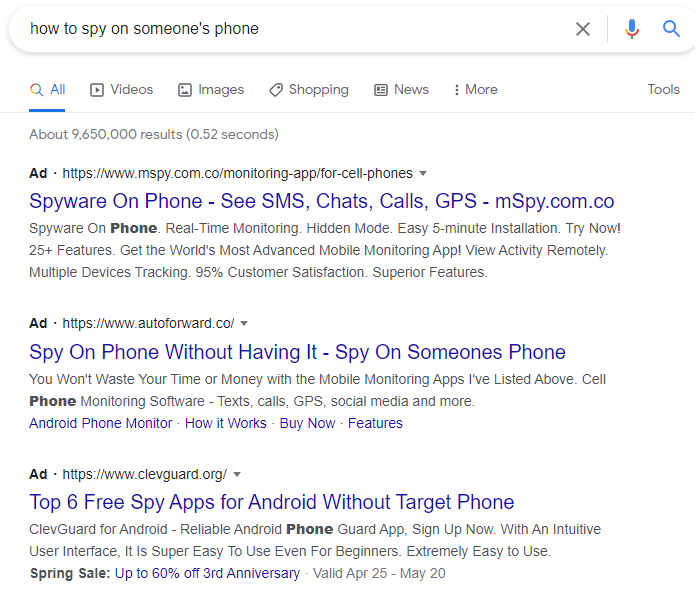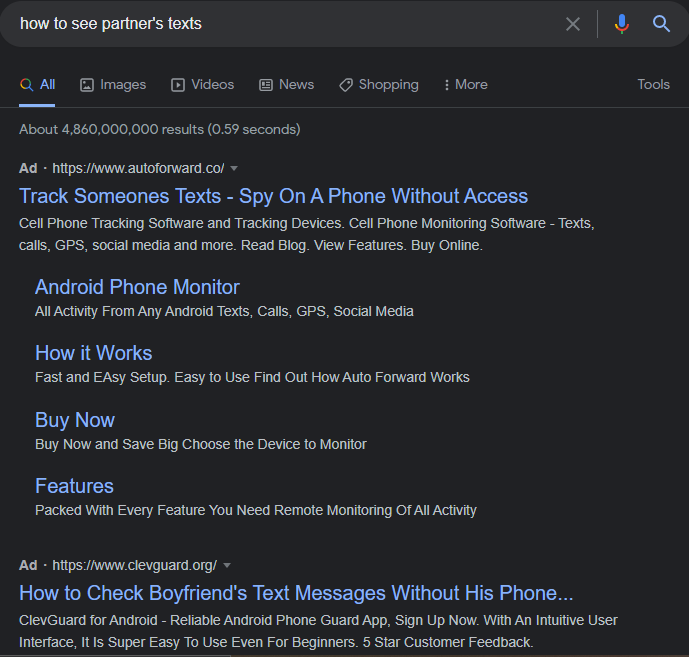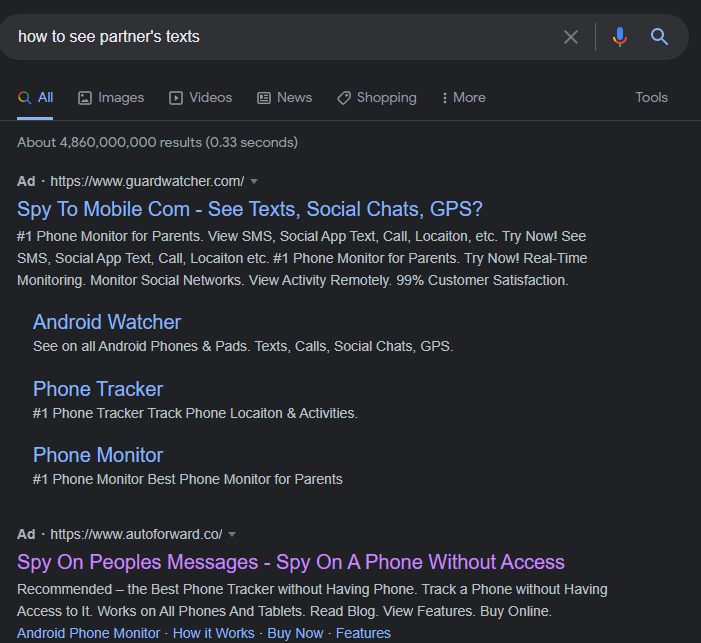People who might want to stalk you through your phone might just be getting help from Google search's advertisements.

(Photo : TONY KARUMBA/AFP via Getty Images)
Ian James Mwai (R), 23, browses social media platforms on his mobile phone with a member of his outfit of social media influencers at an office in Thika town, central Kenya on April 26, 2022.
Stalker's Enabler?
According to a report by MIT Technology Review, stalkerware companies can easily penetrate through Google's ad restrictions on spyware with just a simple search for apps that can spy on your partner's text or other people's text messages.
Google has already updated its advertising policies for stalking apps in August 2022. They have explicitly stated that spyware and other surveillance apps are banned from being promoted in search ads. But apps that can help parents track their children or employers track their worker's devices are exempted from the restrictions.
However, the tech giant seems to have failed in implementing its policy since search ads are still promoting these hacking apps.
Gizmodo picked this issue up and found that by searching phrases like "app to see spouses's text" or "see who your girlfriend is texting", Google generates various ads for apps that enable remote access to SMS and texts.
Tech Times tested these phases themselves to confirm. Specifically, we started with the phrase "how to spy on someone's phone."

However, it must be noted that Spyware on Phone (first search ad) is recognized by several media outlets as a legitimate app for parents to track their children's phones. Hence, it is not violating the policy set by Google.
But things took an interesting turn when incognito was enabled, and we searched for the phrases "how to see partner's texts."

The first ad recommended a list of spywares that can be used, while the second ad interestingly recommended the KidsGuard Pro for iOS app even though it promoted that the spyware is for someone's "boyfriend."
However, when the same phrases were searched in a non-incognito tab, the ads did not appear. But it is also important to understand that these search ads refresh every now and then, so if you try searching the phrases yourself it might generate different results.
Hence, it is important to take the information with a grain of salt.
Tech Times searched for the phases for a second try in the incognito tab, and it yielded these results:

We also searched the phrase "apps to see your spouses' text messages," which was first tried by Gizmodo, however, from our search we did not find any ads.
On Gizmodo's end, their search generated several ads.
Read Also : How To Prevent Stalkerware Apps? Different Types Spyware Applications That Can Record Your Activities
"Nothing New"
According to Gizmodo, this problem is nothing new, citing a blog post last year from the mobile security company Certo Software that detailed how several companies are selling partner tracking software in search ads.
Certo wrote in their post that most of the spyware's websites were portrayed as "safe and legitimate," and their marketing was focused on keeping kids safe or maintaining employee productivity. However, Certo noted that this doesn't stop these apps from being misused to spy on another person.
"To cover themselves from a legal perspective, companies will post fine-print disclaimers on their websites saying that you need to get the device-owner's permission first before using the app," Certo wrote.
"However, we have seen them advertising their products in such a way that suggests its primary use is for spying or stalking," the company added.
Certo concluded in their report that even if these apps were parading as family- and workplace-friendly, they still found several instances of ads and blog posts that encouraged people to spy on their partner.
In fact, Tracking apps like Xnspy, which also includes a parental control, have even detailed a step-by-step process on how to hack on someone's phone when they are asleep or remotely access their settings menu.
In a statement with MIT, Jan Penfrat, senior policy advisor at European Digital Rights said that Google's screening of ads tends to be superficial since they are automated by algorithms.
He also claimed that they make "lots of mistakes" and that research has shown multiple times that it can be easily circumvented.
Stalking through technology or without it remains to be an issue in the U.S. In fact, the Stalking Prevention Awareness and Resource Center reported that there are over 13 million people who are stalked yearly in the U.S.
Related Article : Today is World Password Day, Here Are Ways to Protect Your Password and Personal Security
This article is owned by Tech Times
Written by Joaquin Victor Tacla




